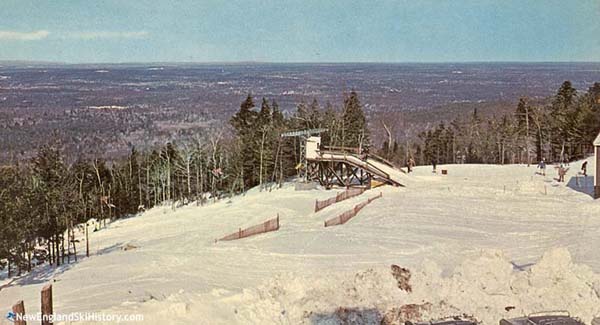
|
| Mt. Agamenticus |
| York, Maine |
| Status: |
Lost/Defunct
|
| First Season: | 1964-65 |
| Last Season: | 1974-75 |
| Vertical Drop: | 500 feet |
| Standing Lifts: | |
| Past Lifts: | 1 double, surface lifts |
| Left: The double chairlift |
| Recent NewEnglandSkiIndustry.com News:
|
|
Located west of oceanside York, Maine, 691 foot Mt. Agamenticus was home to an alpine ski area for about a decade. In recent years, the town has converted the mountain into a four season recreation spot.
Early Years and Ski Development Attempts
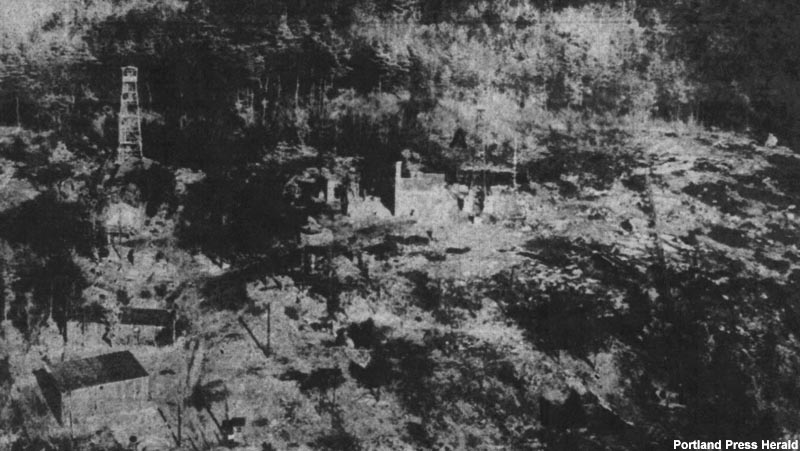
The summit of Mt. Agamenticus circa 1948 |
The early years of development on Mt. Agamenticus centered around detection. The first Mt. Agamenticus fire tower was constructed in 1918, standing for some two decades. Circa 1940, the mountain was scheduled to be turned into a recreational area, however the onset of World War II resulted in the construction of an army radar installation on the summit.
Leveraging the summit road, buildings, and water and sewer infrastructure constructed by the Army, a $300,000 winter sports development was proposed on Mt. Agamenticus in 1948. A "skimobile" (possibly similar to Cranmore) was reportedly planned for lift service. Sperry H. Locke was initially manager of the development group, which included owners Cato R. Philbrick (a York realtor), Roger Lucas (a York undertaker), James H. Lucas (superintendent of the York Water District), and William Foster (a York florist).
The group announced they had $100,000 of capital in late 1949 and were moving forward with plans to have television communications equipment on the summit. Plans for a ski area remained, though the group had not settled on what type of lift would be installed. Plans reportedly stalled due to poor winters, as the Portsmouth Herald reported "there wasn't enough snow on Agamenticus to follow a cat's track."
Big A Development
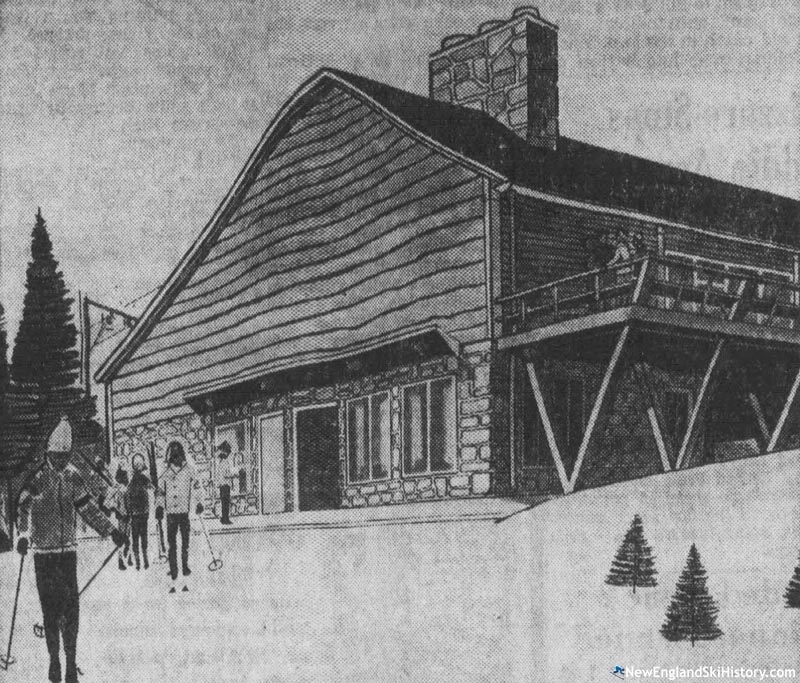
A 1963 rendering of the proposed Mt. Agamenticus lodge |
With lift-served skiing exploding in popularity and snowmaking technology advancing as the 1960s arrived, Frederick Wakelin and A. Guilford Tobey (both of Marblehead, Massachusetts) decided to move forward with a development on Mt. Agamenticus. Word emerged in 1962 that a holding corporation was attempting to acquire land on the top and west side of the mountain. Agamenticus Mountain Corporation was formed on January 2, 1963 with Wakelin serving as president. Roger Lucas and William Foster from the previous development group served as directors. The group hired Sel Hannah to design the $250,000 development.
Initial plans called for an upside-down area with a summit lodge and parking area. Proposed lifts included a 2,500 foot long, 500 foot vertical chairlift or T-Bar and a 900 foot long novice T-Bar. Snowmaking equipment was planned, as "heavy snow is not to be expected at this relatively low elevation and proximity to the coast," according to the Sanford Journal Tribune. Off-season sightseeing possibilities were also included in the business model.
Trail clearing likely started in early 1963. In early April, the group reported that it measured 45 inches of snow on the mountain on March 23, which it said was comparable to major areas to the north. In July 1963, the group announced that it had ordered a Mueller chairlift and, if $95,000 could be raised by August 15, the area would open that winter. Meanwhile, the group settled on the nickname "the Big A," after "Mt. Aggie" didn't catch fire in the papers. Unfortunately, not enough funds were raised and construction was halted that fall. At that point, three of the five trails had been cleared.
On early May 1964, "Agamenticus Mountain Day" open house was held, with door prizes and free ski passes offered to attract visitors to the development.
In July the corporation announced that construction had started on the chairlift and that Ralph Amsden had been hired as general manager. A native of Laconia, New Hampshire, Amsden served in the US Navy during World War II before graduating from the University of New Hampshire. Prior to being hired at Agamenticus, Amsden worked at the Carroll Reed Ski Shop in North Conway, Mt. Whittier, and served as area manager at Pats Peak.
In the fall of 1964, Ronald and Beverly McLeod were named ski patrol directors, while Neil Robinson was named ski school director, splitting his time with Glen Ellen.
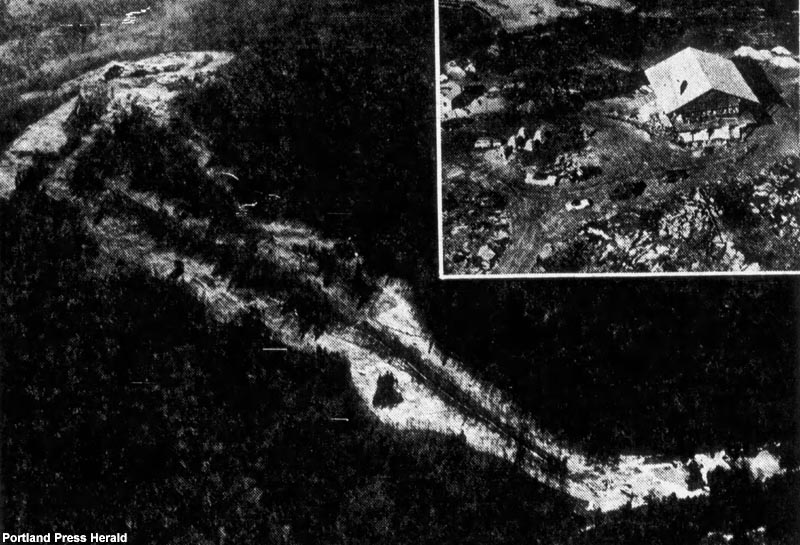
Mt. Agamenticus (December 1964) |
Work ramped up as October came to a close. The summit road was resurfaced, while snowmaking pipeline installation was commenced on three trails. Kilgore marsh was dammed to form a snowmaking reservoir, while a second dam was planned. Pumping infrastructure consisted of two Caterpillar D-6 diesels, while three 600-CFM air compressors were planned. Meanwhile, worked continued on the installation of a chairlift, a T-Bar, and a rope tow. Night skiing was also announced.
Tragedy struck on October 29, as Paul Tart was killed when a Bombardier tractor installing a tower on a ski trail flipped. The 22-year-old from Essex, New York left behind his wife, who was expecting their first child.
Further issues were encountered in November, when the chairlift towers were shipped to Haystack instead of Agamenticus. Meanwhile, construction of the lodge continued.
Big A Opens
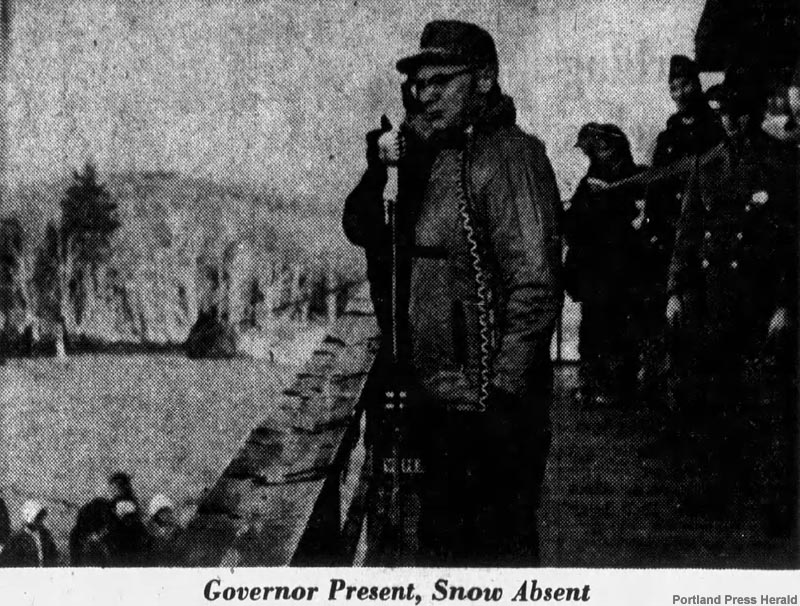
Governor John Reed dedicating Mt. Agamenticus (December 19, 1964) |
Though Mt. Agamenticus saw snowfall in early December as its planned grand opening neared, heavy rain and fog zapped the mountain of snow, with the Waterville Morning Sentinel dismissing it as "typical Maine weather." Nevertheless, work continued at a feverish pace in advance of the planned December 19, 1964 grand opening, with Ralph Amsden telling the Portsmouth Herald, "It'll be close, but we'll be ready."
Unfortunately, the snowmaking system malfunctioned, resulting in no skiing for the area's grand opening. Nevertheless, Governor John Reed officially dedicated the area, declaring that it would "take its place among the giants of the ski world." The Portsmouth Herald reported that "The view from the lodge alone is worth the trip up the Mountain Road and the big picture windows give everyone a fine vantage point from the warm confines inside."
Warm, wet weather persisted. After assistance with the troubled snowmaking system was received from Lost Valley and Poland Spring, Big A finally opened with limited surface-lift-served terrain on January 17, 1965. The Portland Press Herald described conditions as "scratchy," but Ralph Amsden noted, "It's a start." Night skiing debuted a few days later, limited to the T-Bar (plans were announced to add lighting to the chairlift for the second season). The chairlift reportedly opened for day skiing before the end of the month.
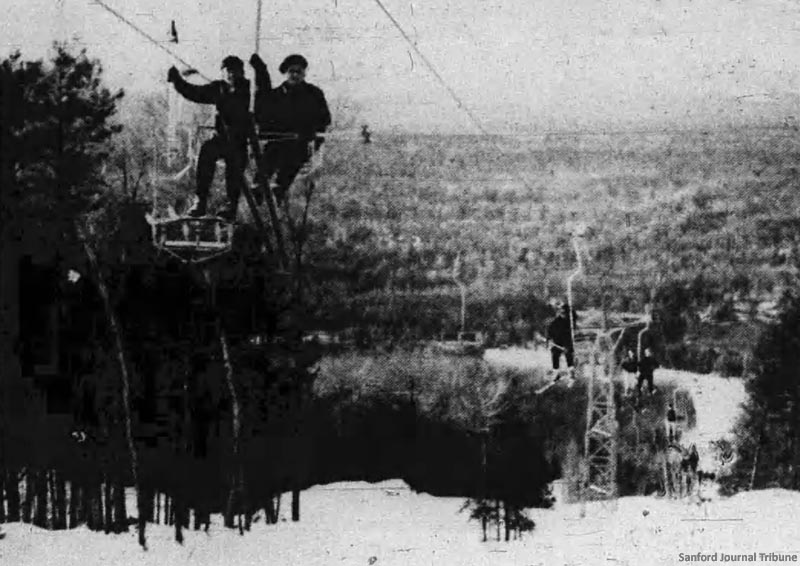
The double chairlift circa early 1965 |
A core part of Big A's early business was high school groups and racing teams, which arrived by the busload on weekday afternoons. Initially a majority of the high school students at Big A were from New Hampshire, not Maine, leaving Ralph Amsden to surmise, "They're more ski minded in New Hampshire than they are in Maine." At the time, Portsmouth High School had the largest ski program at the area.
Skiing continued into February, though rain disrupted the season before the second weekend. The season likely melted out before the first weekend in March.
The business may have been reorganized in early 1965 pursuant to Small Business Administration funding. Off season events were held in the lodge, such as Easter church services and dance parties with live music.
Improvements for the 1965-66 season included cutting the top-to-bottom intermediate Wampum trail, constructing a 200-car parking lot at the base, and rebuilding the snowmaking system.
Patten "Pat" White took over as general manager, as Ralph Amsden departed to become assistant general manager at Crotched Mountain. Ski school director Neil Robinson also departed, filing a lawsuit against Agamenticus Mountain Corporation. John Parkhurst took over as ski school director.
The 1965-66 season likely kicked off a few days before Christmas on manmade snow. Though Big A relied on manmade snow, the season was buoyed by some natural snow mid-winter. March was ushered in with an inch of rain, leaving Big A as the only operating ski area in the state at one point. The season likely lasted until at least mid-March.
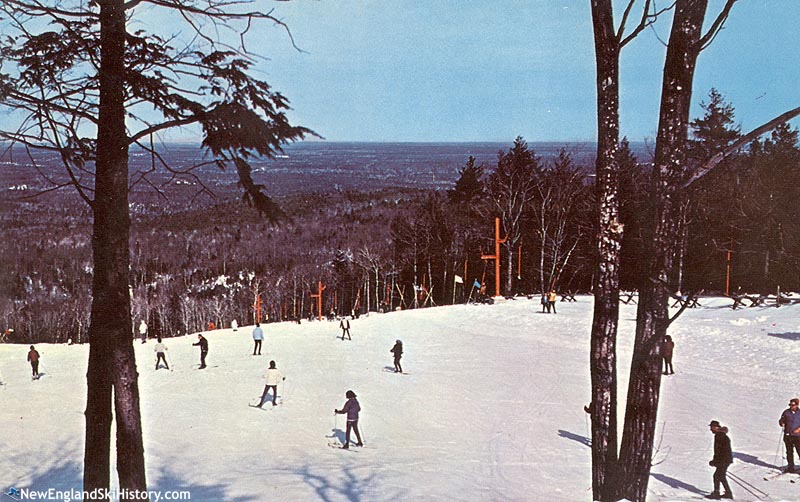
The Abenaki slope |
Night skiing was expanded to the chairlift and a new ski shop opened for the 1966-67 season. In addition, the Wampum Trail was reworked, as it "never really opened to full-scale operation last year," according to the Portsmouth Herald. The season kicked off on manmade snow in mid-December, making Big A one of the only Maine ski areas to operate before Christmas that year.
On January 22, 1967, a chair slid down the haul rope and fell 20 feet to the ground. Two skiers, one of which was the mayor of Haverhill Massachusetts, were hospitalized with multiple broken bones. Compounding the issues, a warmer than normal January resulted in a multi-day closure at the end of the month, with the Portland Press Herald noting, "what was good for the beach [activity at York Beach] was bad for the nearby "Big A" ski area where warm weather raised havoc with the slopes."
Conditions improved as March arrived, with base depths advertised as 1 to 3 feet. The season likely ended at the start of April. Patten White told the Portland Press Herald that "It was our best season, and thanks to successful snow making to supplement the natural snow we even got some of the Christmas holiday business, which we never had before." Despite record revenue of $104,422, the area posted a net loss of $22,005.
Meanwhile, the Portland Press Herald publicized plans to install a new T-Bar "three-quarters of the way up the mountain, where there is extensive terrain to develop." The project was contingent upon Maine Recreation Authority funding.
1967 Foreclosure
In June, corporate president Matthew Murtha informed shareholders that the company faced "almost certain" bankruptcy if it was unable to obtain a $250,000 loan guarantee from the Maine Recreation Authority, noting "since we are gradually reducing the large debts incurred during the first two seasons and struggling with high interest payments on our initial loans, it has been almost impossible for us to show any profit."
Murtha added, "directors can no longer continue to make annual contributions of many thousands of dollars per year - just for the privilege of working long hours without pay for the corporation." The corporation criticized the state for allocating much of its money to the Bigelow Mountain development rather than southern Maine.
In July 1967, James Talcott, Inc. foreclosed on Agamenticus Mountain Corporation relating to a $100,000 loan issued at 11.5% interest issued in 1964. Despite the financial woes, the area remained operational, with Ralph Amsden returning as general manager and ski school director John Parkhurst working on developing additional racing programs. A snowcat was acquired to improve slope conditions.
The 1967-68 season likely kicked off just after Christmas, seeing near capacity crowds during the weekend preceding New Year's Day. The season likely came to a close on St. Patrick's Day, with overall skier visits improving despite a 30% reduction in operating days.
Expansion Plans
Rumors of Big A's demise swirled during the 1968 off-season, however in September Ralph Amsden announced, "The financial outlook is much better this year than it has been in the past." American Resorts Consultants, Inc. was hired to create financial and development plans for the area. Amsden told the Portland Press Herald of plans to construct another chairlift, cut new trails, and improve snowmaking, adding "if we don't do it this year, chances are good we'll do it next year."
Agamenticus Mountain Road was improved by the state during the 1968 off-season. That fall, the Cumberland Motor Club staged its first hillclimb on Mt. Agamenticus, with Steve Pesce winning the 0.7 mile race in his Camaro with a time of 43.5 seconds.
Tom West was named ski school director for the 1968-69 season. The name "Big A" began to be co-marketed as "Mt. Agamenticus." Around this time, York Corner Holding Company was integrated into the financial structure. Skiing likely kicked off just before Christmas. While some areas to the north benefitted from multiple large snow storms, Big A struggled with multiple rain and thaw events. Nevertheless, the area was able to report base depths of 1 to 3 feet by mid-February. In order to drum up more business, the area offered midweek rates during February vacation week. Base depths reportedly grew to nearly 3 to 4 feet by early March before quickly melting at the end of the month.
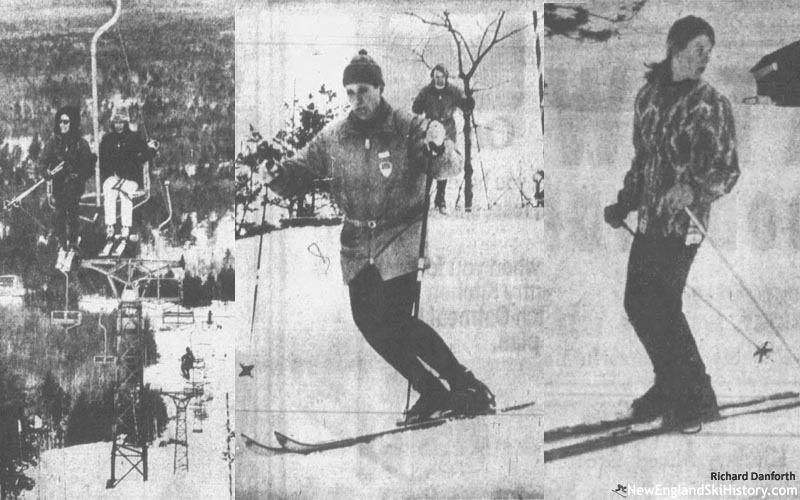
The Big A in March 1969 |
In March 1969, Ralph Amsden told the Biddeford Saco Journal that a new chairlift would be installed that year, and that the corporation was planning to turn the Big A into a year-round resort with a motel, golf course, and swimming pool. Amsden told the paper, "The three months or so we get from skiing aren't enough to run a big outfit economically."
A new expert trail was cut for the 1969-70 season (possibly to skier's left of the chairlift), while the T-Bar base terminal was relocated 100 feet downhill to improve loading. A cross country ski trail was also reportedly cut and John Parkhurst returned as ski school director. Operations were scaled back to Wednesday through Sunday. The season started when a snow storm hit a few days before Christmas. Warm torrential downpours arrived just after Christmas, putting a damper on the holiday weekend. Ralph Amsden told the Portland Press Herald, "I've never seen an ice storm like it," noting the area lost $10,000 in business and sustained damage to its lighting and snowmaking infrastructure.
The area managed to have a record January, however rains shut down Big A for the first half of February. Ralph Amsden told the Biddeford Saco Journal, "The year had the makings of a real good season...but along came the rains," adding, "Unless the weather changes, we may be in for a disastrous year." The area reopened in mid-February, with the season running through the end of calendar winter.
Big A continued its Wednesday through Sunday schedule for the 1970-71 season while trying to appeal to non-skiers with offerings such as Saturday night lobster bakes. A new trail was reportedly being cut as the season started in mid-December. As Christmas neared, there was enough snow to reportedly open the Wampum trail for the first time in two years. A Christmas Eve blizzard further boosted base depths to nearly two to four feet. Ralph Amsden told the Portland Press Herald, "We've never had such good business or skiing," adding that the area was seeing 500 to 600 skiers a day. The season lasted through the end of calendar winter.
Meanwhile, in December 1970, Joseph Briley foreclosed on a mortgage he had issued to the Agamenticus Mountain Corporation in 1963. In February, Briley, Agamenticus Mountain Corporation, and York Corner Holding Company reached an agreement to pause foreclosure proceedings in exchange for a payment schedule.
Name Change
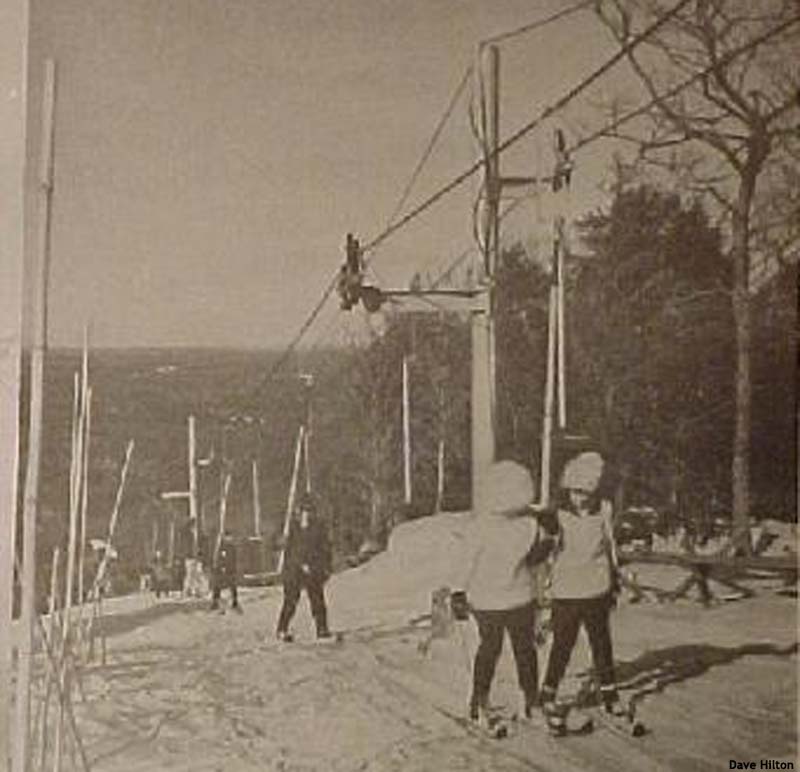
The Big A T-Bar |
Big A enjoyed rare November operations in 1971 before reopening for Christmas week with a small base.
In January 1972, the area announced it was shedding the "Big A" moniker in favor of "Mt. Agamenticus." Ralph Amsden told the Bangor Daily News, "It may be a little harder to say Agamenticus, but it's a bit more distinctive. There are enough big "A's" around including a race track in New York State but only one Agamenticus."
Despite the early opening, the 1971-72 season was a struggle at Mt. Agamenticus. An early February snow storm gave way to high winds, wiping out snowpack. Ralph Amsden was quoted in the Associated Press as lamenting, "I just wonder why the buildings didn't take right off the mountain," adding, "It's just a question of how much money we're going to lose," noting that 1971-72 was worse than the 1964-65 season.
Lighting was improved for the 1972-73 season, with Mt. Agamenticus maintaining a Wednesday through Saturday night skiing schedule. The season likely kicked off a week before Christmas on a thin base with bare spots.
On the evening of January 17, 1973, the chairlift reportedly deroped, resulting in an evacuation. During the process, the haul rope dropped off a sheave train, dropping four skiers 20 feet to the ground. The four were sent to the hospital, two of whom were held overnight due to their injuries.
Spring came early in 1973, likely melting out the season at the start of March. Around this time, a proposed 500-acre development called "Agamenticus Park" was advertised by American Agamenticus Resorts.
Meanwhile, word emerged of a proposed 4,000 to 5,000 acre development involving Mt. Agamenticus. Initial plans included a Robert Trent Jones championship golf course, a convention center, real estate, and an expanded ski area. Representatives did not indicate who was behind the project, or if it was connected with the American Agamenticus Resorts development.
Financial woes were becoming apparent as the 1973-74 season arrived. In part due to the energy crisis, Mt. Agamenticus moved to a Friday-Sunday operation. The mild season likely didn't start until mid-January, coming to a close only a few days later.
On August 14, 1974, Agamenticus Mountain Corp. transferred its holdings to American Agamenticus Resorts, Inc.
Despite the devastating 1973-74 season and rumors of its demise, Mt. Agamenticus managed to open just after Christmas in 1974. The season, and Mt. Agamenticus's lift-served skiing history, likely came to a close in late February.
Expansion Proposed, Area Closed
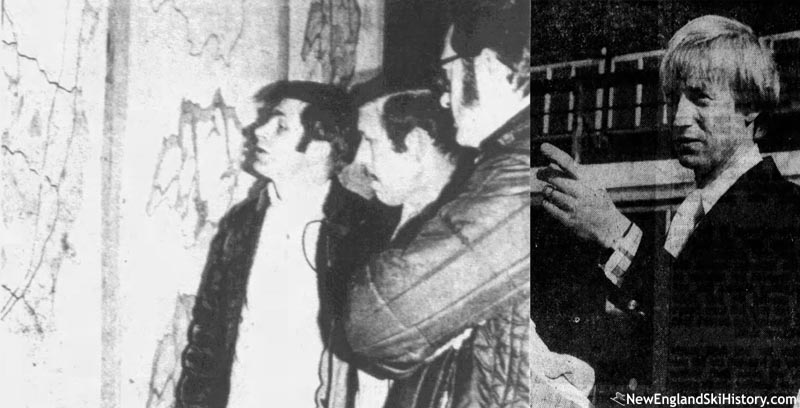
South Berwick residents reviewing Mt. Agamenticus development plans (left) and F. Anthony Zahn (right) circa the mid 1970s |
Following the 1974-75 ski season, owner F. Anthony Zahn, an Oklahoma Democratic politician and financier, proposed a massive real estate development on Mt. Agamenticus. By May of 1975, Zahn reportedly owned 500 acres and had 3,500 more under contract with hopes of building up to 3,500 homes. As part of a $5 million project, Zahn planned to add more lifts and expand snowmaking at Mt. Agamenticus, as well as to build a golf course and riding stables.
Local opposition from York and South Berwick residents quickly emerged. Zahn indicated that he would not proceed with the plans if the towns opposed the project, but noted that he would not "denude the land" and would not be involved "in any project that would tarnish my reputation," particularly since the 35-year-old politician was planning to run for Congress.
In May 1975, voters of York and South Berwick overwhelmingly voted no to referenda about developing Mt. Agamenticus. In addition, residents voted in favor of purchasing and preserving Agamenticus area land. Following the vote, Zahn said he was willing to sell the land to the towns, provided that he could recover his costs incurred, estimating the price tag at $556,000 for his direct investment and $1.3 million in purchase options that would be assumed. Zahn also floated an alternative plan of developing 500 homes on 500 acres of land in conjunction with expanding the ski area.
Zahn set a target of September 1975 for a sale to the towns. After that goal was not met, one of Zahn's partners, Clinton Nangle, proposed constructing a 150-site recreational vehicle campground on the summit.
In the summer of 1977, York Corner Holding Company foreclosed on the ski area property, scheduling an auction of the 175-acre tract and buildings. As the date approached, potential uses for the property were suggested, such as an alpine slide operation or a mountaintop hotel or restaurant. In the end, York Corner Holding placed the high bid for property at $325,000.
Weeks after the auction, Mt. Agamenticus was announced as a potential location for the United States Strategic Petroleum Reserve. Noting the mountain's potential rock cavern, the site was submitted to the federal government by the Maine Department of Conservation.
Transition to Public Ownership
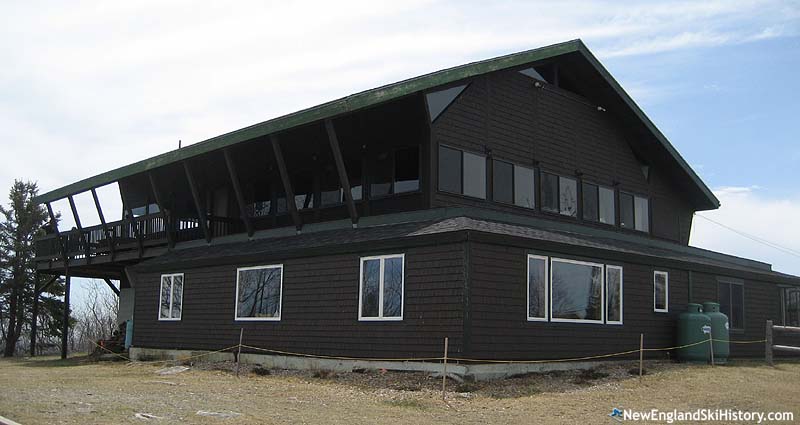
The lodge (2007) |
On January 13, 1978, F. Anthony Zahn's Algonquin Corporation, formerly known as American Agamenticus Resorts, Inc., transferred property to York Corner Holding Company.
Talks of a town acquisition of the former ski area property continued in late 1979, as York Corner Holding Company's principal shareholder Matthew Murtha said, "The mountain is going to be sold darn soon, either to the town or not. We're giving the town first crack at it because we would rather see the town buy it."
In the spring of 1980, the town of York acquired 300 acres on Mt. Agamenticus from York Corner Holding Company.
Agamenticus Mountain Corporation founder Frederick Wakelin passed away at the age of 71 on February 27, 1985.
In 1988, 3,000 acres of land on and around Mt. Agamenticus were identified as a priority for the Land for Maine's Future Board to purchase and preserve. In the fall of 1990, the state entity announced it would be purchasing a 280-acre tract on the mountain from the Amoskeag Development Corporation for $210,000. The state announced additional purchases in subsequent years, increasing its holdings to over 1,000 acres. Meanwhile, the town of York renovated the summit area, possibly removing the chairlift. The old ski lodge became a wedding and event venue, while a network of hiking and mountain biking trails became popular.
On May 23, 2004, the David N. Hilton Memorial at Mt. Agamenticus was dedicated in honor of the long time firewarden, skier, and historian.
Former manager Pat White passed away on April 15, 2016 at the age of 76. Former owner F. Anthony Zahn passed away on April 1, 2024 at the age of 84.
Today, the 10,000 acre Mount Agamenticus Conservation Region features multi-use trails that weave through the abandoned ski area.
Lifts
Click on lift name for information and photos
Maps
Year by Year History
Adult Weekend Full Day Lift Ticket; Adult Full Price Unlimited Season Pass. Window price, including RFID fee and taxes when known.
| 1970s |
Ticket Price |
Season Pass Price |
Pass Payback |
Opening Day |
Closing Day |
Skier Visits |
| 1974-75 | $6.50 |  | |  | | December 26 | | |  | | | 1973-74 | $6.50 |  | |  | | | | |  | | | 1972-73 | $6.50 |  | |  | | | March 4 | |  | | | 1971-72 | $6.00 |  | |  | | November 27 | March 19 | |  | | | 1970-71 | $6.00 |  | $60.00 |  | 10.0 days | December 12 | March 21 | |  | | | 1969-70 | $5.00 |  | |  | | December 20 | March 20 | |  | |
| 1960s |
Ticket Price |
Season Pass Price |
Pass Payback |
Opening Day |
Closing Day |
Skier Visits |
| 1968-69 | |  | |  | | | March 30 | |  | | | 1967-68 | |  | $60.00 |  | | December 27 | March 17 | 30,000 |  | | | 1966-67 | |  | |  | | December 17 | April 2 | 25,000 |  | | | 1964-65 | |  | |  | | January 17 | March 5 | |  | |
Visitor Memories
| "Mt. Aggy is a special place. The amazing view of York's shoreline all the way up to Drakes Island in Wells, is unique and breathtaking. Someday after a proper blizzard, I'll hike to the top and snowboard down those ancient trails. A great cure for the midlife crisis." | | LUCKY BISTOURY, Sep. 24, 2025 | | "My dad, David Hilton, manned the fire tower for many years. His memorial is at the base of the tower. I used to go with him to the mountain and I would volunteer at the horse stables while he was up in the tower. I did that for 7 summers taking care of the horses, getting them ready for riders and going for rides myself. Such a special place for me filled will ever lasting memories." | | Lora H. Greene, Aug. 13, 2025 | | "My boyfriend and I went here today for my 24th birthday. While walking the trails we noticed these big rusty poles with wheels on them and wondered what they were and my bf guessed they were for ski lifts so on the way home I looked up the history of this place and l found this website and was very amazed of the long interesting history of Mt. Agamenticus!" | | Mika C, May. 21, 2025 | | "It was 1971 and I was stationed at Pease AFB then at the age of 20. I remember a group of us from the airbase would pile in a van and head to the Big A, as I recall it known for that. It was the very first time I ever skied and recall telling my family back home that I went skiing for the first time. The Big A branded memories that I still reflect upon from time to time now at the age of 74." | | Tim Thomas, Jan. 9, 2025 | | "Like to hike here when I'm on the east coast. A lot of pleasant, easy wooded trails. Interesting to visit the top - love exploring ghost ski areas. Be fun to poke around skinning & skiing in the winter if there was enough snow. Kinda recall a hot dog stand somewhere close on the highway? " | | JT More, Apr. 16, 2024 | | "When I was 8 years old in 1965 my mom and I took a winter trip to York Beach and I went skiing for my first time at ‘the Big A’. I remember there was a T bar and I tried to sit down on it and fell off. I had lace up boots and the old ‘explode-o-mat’ bindings. I fell in love with skiing at the Big A and still love it at age 64. Such great memories!" | | tracy jones, Feb. 18, 2023 | | "At fifty my mum and dad took up skiing so that we could have an active, family outing. As Big A was not too far from Peabody, MA, this is where we would often ski. So many wonderful memories of fun times here! Thanks for posting all the historic information! " | | Denise Hudnall-Sokolsky, Mar. 20, 2022 | | "My family skied there, so convenient,...right at the end of our road. Accessing the summit could be a challenge with ice. Dad decided to try backing up the hill, cause he had a brand new front wheel drive car. It worked. Such a fun place to go as kids. " | | Melanie Buswell, Jan. 14, 2019 | | "Our family has passed there for many years. What great fun we had! Night skiing, ski school, it was great. We had some great skiers start there . We all had funny stories to share. Our night time trips down to Flos hotdogs, wed order 50 hot dogs...and Flo would throw us out! I was on the chair lift when it came off the rails and two skiers died. We spent 10-12 hours stuck up there until they got to us to lower us down by ropes! Scary! And yet we returned the next day to ski!! We all loved that mountain!" | | Amy Goldman, Jan. 14, 2019 | | "Our family enjoyed this ski area so much...as a southern gal, I learned to ski there and loved the hot chocolate and fire in the lodge...." | | mrs Hal Carney , Jan. 11, 2019 | | "I remember scoring my 1,000 point (only my sophomore year) and then trucking up to Big A with John Bridges. The double lift was the best, John and I would close our eyes and pretend we were dragons flying abouve the mountain...Also where I fell and got a compound fracture in my tibia and was never able to play hoops again..pretty much ruined my college career..oh Big A..giveth and taketh away!!! " | | Jay Moore, Jan. 11, 2019 | | "our family had passes 197-75. skied every spare minute there,55 days/year. lots of rain and ice, thus i think the 1st snowmaking system in ME; a giant single cannon attached to snow cat, plus a few ground based nozzles. when it dumped, thousands came from boston. lift lines were over an hour long. would love to see a lift there again someday, but seems impossible." | | harold birbank, Jan. 10, 2019 | | "I love this big a part out life I’m a yorky and we ski there much we could friend family it good get together cooking bean in fireplace" | | Richard Foster, Jan. 10, 2019 | | "They had a great toboggan run there in the 60's. My dad would take us skiing there also when we lived in Portsmouth." | | Raymond Bates, Mar. 11, 2018 | | "Many memories for me. I worked there the 10 years it was open (except 68-69 season I was in Vietnam). Was on the ski patrol, lift operator, snow cat driver,and snow making " | | John Dennett, Oct. 19, 2017 | | "I skied The Big A several times as a kid. I remember one trip with my Dad necessitated a trip to a garage in nearby York so we could have chains put on our old 1955 Ford station wagon, enabling us to finally climb the steep access road. Wind at the top could be a problem, but I have great memories of my ski trips there." | | Pat Phelan, Sep. 11, 2017 | | "I skied the Big A when I was a kid. It was fun.
We could see it from Annisquam" | | Will Bloombergh, May. 1, 2017 | | "My family, Micum McIntire, held our August family reunions on Mt Agamenticus for several years.. Micum became a land owner in York in 1671. We've been holding our reunions for many,many years. Most recently at the Historial Society in York." | | Carole Ranco, Mar. 14, 2017 | | "I remember my Dad taking us there on Sunday afternoons and sometimes we went for night skiing. We lived in Portsmouth so it was convenient. They had a toboggan run that was really .We really have a lot of enjoyable memories of The Big A." | | Raymond Bates, Mar. 12, 2017 | | "There were a number of New England championship enduros for dirt bikes in the 1970s that created numerous trails. Many are used for hiking and biking today. The last race was an all women event called the Powder Puff enduro." | | Peter Anania , Mar. 11, 2017 | | "Dad was one of the original investors in the Big A. He owned a local market on Organug Road across from the high school. When my brother Frank and I could get away from school and work obligations we skied there often. The snowfalls at that time and the temperatures were great for skiing. I was an original member of the Juinor Ski Patrol. It was a wonderful part of York." | | Philip Filosa, Mar. 10, 2017 | | "I have many pictures of our family traveling there from a Hamilton MA
To ski during the late 60s. Loved the novelty of the
Inverted hill ." | | Kim White, Mar. 9, 2017 | | "I ski there when I was kid we love it my mom use bring us meal to top and eat in lodge so we could keep skiing a lot friend we're there" | | Richard Foster, Mar. 9, 2017 | | "Skied and had lessons weekly through Portsmouth HS in the mid-60s. Many great times with school friends; I didn't realize it was open for such a short time. I do recall skiing one night when the power went out and stayed off. No problem anywhere else, but the parking lot was atop the mountain by the lodge. Quite a hike up. " | | Bob Jarrett, Mar. 8, 2017 | | "I have fond memories of the lodge and ski area. I knew one of the caretakers after the ski resort was shut down. Spent many an evening looking down the ski slope to York harbor! It was peaceful and beautiful!!!!" | | Cinda Roy, Mar. 8, 2017 | | "I skied the Big A in the 60's and recall great times with my brother, sister and parents who were regulars up in Maine during the summer season. How fun to be up there with waist high snow drifts alongside the roads into which my father fell once, having a hard time getting out! I loved the Big A and the memories of St. Aspinquid who is buried at the top of Mt. Agamenticus." | | Edward Suffern, Jan. 17, 2016 | | "I skied the Big A a couple of times with my family in the late 1960s travelling up from Ipswich, MA. Two unique features, as I remember, were that one parked at the top of the mountain where the main lodge and ticket office were located and you could see the ocean from the top. The Big A was a really fun place particularly after a good snowstorm." | | Nibs Nichols, Oct. 16, 2014 | | "My wife and I visited the Big A today, 8/14/13.....what a beautiful place. Sad to see the old signs of a the old ski area. I grew up in NH and we too had a defunct ski area close. Like the Big A the trails are grown in and some equipment is left. Memories of some good times back in the 60s and 70s." | | Ed Murray, Aug. 14, 2013 |
|
External Links
Mt. Agamenticus - New England Lost Ski Areas Project
Mt. Agamenticus at York Maine - archive.org version of the late Dave Hilton's web site
Mount Agamenticus Conservation Region
|
Last updated: April 16, 2024
|



